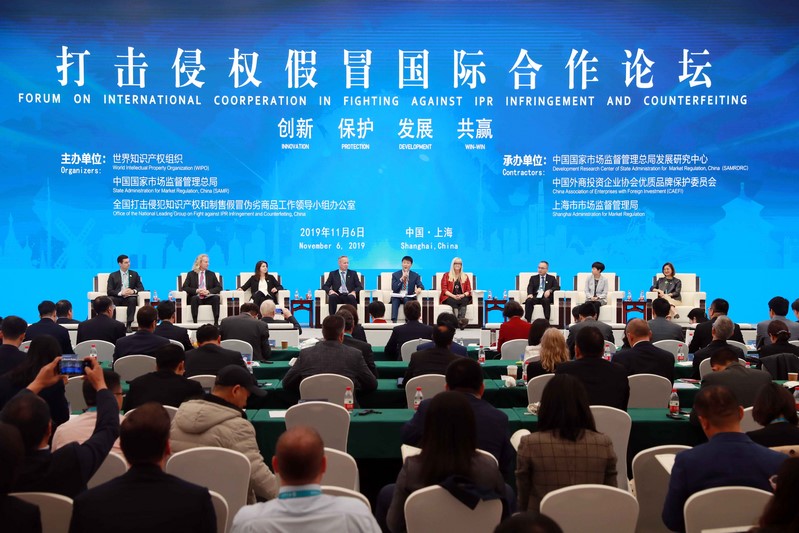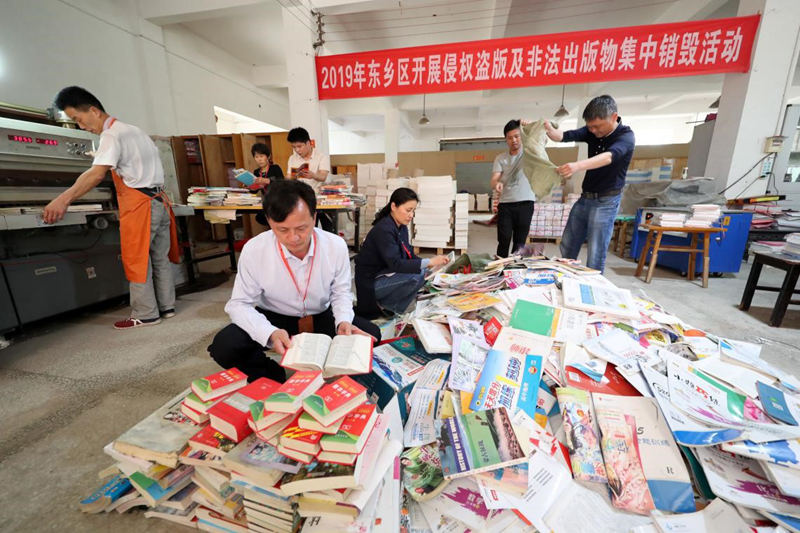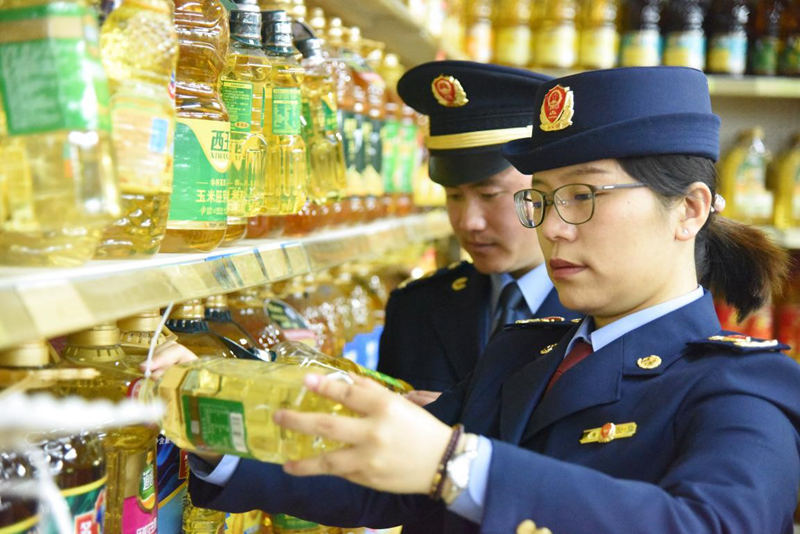China contributes to global intellectual property rights protection
By Li Xinping, People’s Daily
China has developed a path of intellectual property rights (IPR) protection with Chinese characteristics through perseverance and constant exploration.
The country was ranked 14th among more than 100 economies worldwide in a global innovation ranking in 2019 by the World Intellectual Property Organization (WIPO), moving up 11 spots from 2016. It has been the fourth year straight for China to have lifted its ranking in this regard.
The ranking indicates the recognition of the international society on China’s active efforts to protect IPR and crack down on IPR infringements.
China’s progress in IPR protection was applauded by Chinese and foreign corporations present at a forum on international cooperation in fighting IPR infringement and counterfeiting held during the second China International Import Expo (CIIE) on Nov.6.

A forum on international cooperation in fighting IPR infringement and counterfeiting is held during the second China International Import Expo (CIIE) on Nov.6. Photo by Chen Wei
At the forum, domestic and foreign guests gathered together and shared their insights on building a global governance pattern of IPR protection and combating IPR infringement and counterfeiting.
J Bruce Schelkopf, senior vice president and global chief IP officer of ABB, said China is optimizing environment for IPR protection in the making of laws, regulations and policies, as well as law enforcement and juridical protection.
China ranks 31st among 190 economies in terms of ease of doing business, up from the 46th last year, according to a newly-released report by the World Bank. It is the second year in a row that the country has ranked among the top 10 economies in the world that improved the most on the ease of doing business, said Gan Lin, vice director of the State Administration for Market Regulation of China, pointing out that new progress has been constantly made in innovation and development.
The WIPO has long been dedicated to enhancing global IPR protection and building a balanced and efficient IP management and application system, with the aim of promoting innovation-driven development of the world, said Minelik Alemu Getahun, assistant director general of WIPO.
Chinese government places high importance on IPR protection and anti-infringement and anti-counterfeiting, actively strengthens coordination on IPR protection, and enhances collaborative cross-agency, cross-regional and cross-border enforcement efforts, he pointed out, adding that these experiences and practices are globally exemplary.
In 2019, China has taken new efforts and made new progress in fighting against IPR infringement and counterfeiting.

Law enforcement officers in Dongxiang district, Fuzhou city, east China’s Jiangxi province destroy 3,600 pirated and illegal publications on April 23, 2019. Photo by He Jianghua
By building a more complete legal system, the country has laid a solid legal foundation for the fight against IPR infringement and counterfeiting.
On January 1, the E-commerce Law took effect, requiring e-commerce operators to protect intellectual property rights and fulfill their obligations and responsibilities. The revised Trademark Law increased the upper limit of compensations that may be imposed on trademark infringement.
On October 22, the State Council released a regulation on improving business environment, which said that the country will set up a punitive damage system for infringements on intellectual property and improve the mechanism for rapid and coordinated IPR protection. Besides, the Foreign Investment Law will come into force on January 1, 2020.
China is perfecting a punitive damage system for infringements on intellectual property and strengthening the top-level design in this respect.
The country has created a better environment for IPR protection through launching harsher punishments.
From January to August, Chinese police arrested about 16,000 suspects involved in
13,000 cases of IPR infringement and counterfeiting. Chinese courts at all levels tried 11,000 cases related to IPR of first instance, and concluded more than 8,300 cases, a significant increase from the same period last year.

Law enforcement officers of the market management bureau of Donghai county, east China’s Jiangsu province check IPR trade mark of edible oil on April 25, 2019. Photo by Zhang Zhengyou
Procuratorates across China approved the arrest of over 10,000 suspects involved in more than 6,000 IPR infringement and counterfeiting cases. A total of 16,000 suspects involved in 8,600 such cases were prosecuted. In a word, the country is fortifying efforts on IPR infringement crackdown.
China has provided comprehensive support for IPR protection through carrying out stronger special rectification actions. Between January and August, the law enforcement departments at all levels investigated and punished 190,000 infringement and counterfeiting cases related to IPR. The tough sanctions have quickly prevented a series of general violations.
In recent years, there is an increase in cross-border flows of infringement and counterfeiting products, and an increase in cross-border crimes, said Gan, adding that the integration of online and offline crimes and more organized crimes have posed severer challenges for law enforcement.
Rising trade protectionism, unilateralism and zero-sum mentality also hinder joint efforts of the international community in cracking down on IPR infringement, she pointed out.
China will continue deepening international cooperation, building and perfecting multilateral and bilateral law enforcement mechanisms, enhancing evidence sharing and joint investigation and strengthening coordination and information feedback, so as to jointly crack down on cross-border crimes related to IPR.
Intellectual property is a valuable asset of humanity, and combating infringement and counterfeiting is the common responsibility of the international community.
Strengthening intellectual property protection is also the biggest incentive to improve China’s economic competitiveness. China is willing to work closely with all countries in the world to march forward, make unremitted efforts, and contribute Chinese wisdom to protecting the achievements of human civilization and safeguarding people’s life.












